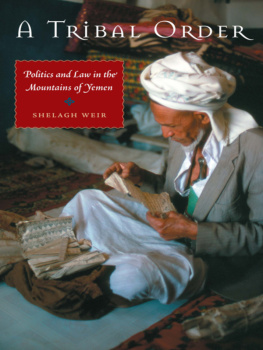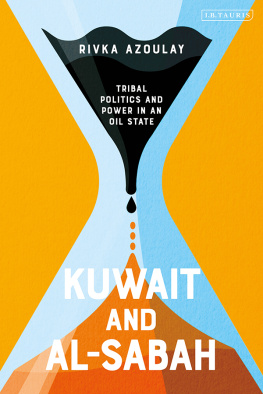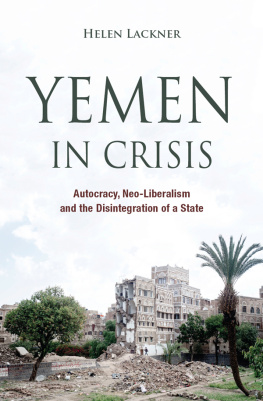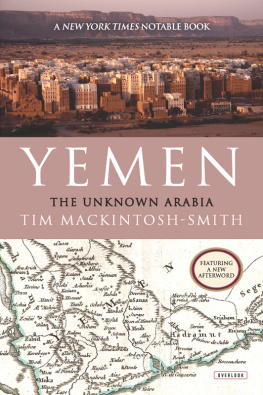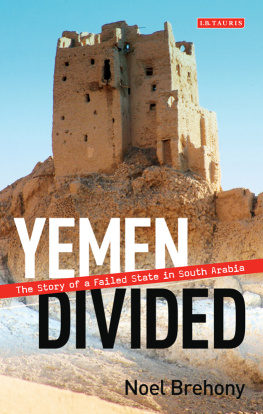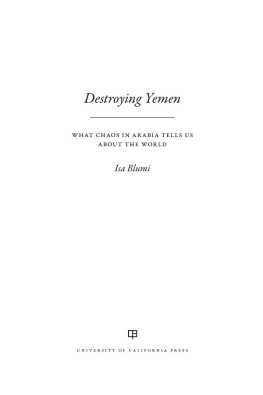MODERN MIDDLE EAST SERIES, NO. 23
Sponsored by the Center for Middle Eastern Studies (CMES)
The University of Texas at Austin
A TRIBAL ORDER
Politics and Law in the Mountains of Yemen
BY SHELAGH WEIR
UNIVERSITY OF TEXAS PRESS
Austin
Copyright 2007 by the University of Texas Press
All rights reserved
Printed in the United States of America
First edition, 2007
Requests for permission to reproduce material from this work should be sent to:
Permissions
University of Texas Press
P.O. Box 7819
Austin, TX 78713-7819
utpress.utexas.edu/index.php/rp-form
Library of Congress Cataloging-in-Publication Data
Library ebook ISBN: 978-0-292-79555-6
Individual ebook ISBN: 978-0-292-77397-4
DOI: 10.7560/714236
Weir, Shelagh.
A tribal order : politics and law in the mountains of Yemen / by Shelagh Weir.
p. cm.(Modern Middle East series ; no. 23)
Includes bibliographical references and index.
ISBN-13: 978-0-292-71423-6 ((cl.) : alk. paper)
ISBN-10: 0-292-71423-8
1. TribesLegal status, etc.Yemen. 2. Peaceful societiesYemen. 3. Tribal governmentYemen. I. Title.
KMX1246.7.M56W45 2007
953.32dc22
2006031834
In memory of Ernest Gellner
CONTENTS
List of Figures
List of Tables

This book is based on seventeen months fieldwork on Jabal Rzi in the far north of the Republic of Yemen, where I spent from March to October 1977, October 1979 to May 1980, and January and February 1993. The ethnographic present therefore refers to that period. Throughout my fieldwork I lived in the tiny town or madnah of al-Nar, the main settlement of a tribe in southern Rzi. During my first two stays I maintained a semi-independent household; and on my third I lived en famille in the house next door. The madnah was an ideal fieldwork base. It is socially and occupationally heterogeneous. Men prominent in tribal and government affairs were among my neighbors. And visitors came from far and wide to its lively weekly market. I did most of my research in and on the tribe of al-Nar, one of the ten small tribes of Rzi, partly because I wanted to understand one community well, and partly because travel was difficult in the mountainous terrain. There were no motor tracks during my first fieldwork in 1977, and although the construction of a trans Rzi track and feeder tracks had begun by 1979, travel remained slow and most places could still only be reached on foot. Although I traveled widely in Rzi and visited the neighboring tribal region of Uqrib, therefore, my deepest firsthand knowledge is about the tribe of al-Nar, and I describe the tribal system of Rzi mainly from that perspective.
No-one in Rzi spoke English, so all my fieldwork was conducted in Arabic. The local dialect, or language, is extremely unusual, and was always a difficulty, but some male informants could switch registers to a form of Arabic I could understand more easily. My linguistic struggles were greatly helped by Bonnie Glover Stalls, a specialist in Arabic dialects, who accompanied me to al-Nar for two months in 1979 to study spoken Rzi, and has continued to provide helpful advice. I was also aided in the field by Cynthia Myntti, who came for a month in 1977 to do a health study, and by Ian Dunn and Michael Dunn, who visited for a month in 1977 to make a film. Ian also kindly helped me map the madnah and tribal territories during a second short stay in 1980. Apart from these visits, I was unaccompanied during my fieldwork. Being a lone foreign woman was an advantage. I could cross the gender divide as no man could do, and women could visit me without prejudicing their reputations. I explained that I was studying customs and traditions and history, and this was accepted.
This research was conducted under the auspices of the British Museum, where I was curator for Middle Eastern ethnography at the former Museum of Mankind. I initially intended to study crafts (Weir 1975), and I made a collection of artifacts for the Museum. I was also interested in the local economy, on which I have previously published (Weir 1985a, 1985b, and 1987). Then at the start of my second visit, in 1979, a dispute broke out between al-Nar and a neighboring tribe. This breakthrough event, which I describe in , and they are referenced in the text with the prefix D. I regret that it has been impossible to translate or reproduce many of these fascinating documents in this work because of lack of space, but I plan to do so elsewhere, and the reader is meanwhile referred to Weir 1996.
Most of the documents I copied are pacts and treaties among and between tribal groups, between tribes and state authorities, and among the ruling elite themselves. Whenever problems arose, men gathered (as they still gather) to resolve them, and recorded their decisions, judgments, and agreements in handwritten papers which they preserved for future reference. These documents are an invaluable primary source, for they catch local people inscribing their own system for their own purposes at different periods. They provide a wealth of information about tribal political and legal matters. Because they are usually dated, and invariably name the participants of the meetings at which they were written, they also make it possible to track individuals and groups, and their relationships, back through time; however, they only rarely and briefly provide information about events such as would facilitate a narrative history. Overall, the documents testify to the predominantly contractual basis of political relations in Rzi, and to remarkable continuities in structures and practices, both of which are major themes of this work.
Throughout my fieldwork I gathered social information indiscriminately while participating in everyday life and special occasions. I also collected data by more formal methods: photography, tape recordings, censuses of selected settlements, and surveys of occupations, land-ownership, and the market of al-Nar. With local help I also did preliminary translations of documentsa difficult task which has continued over subsequent years, and delayed the completion of this work. This variegated material has allowed me to present my themes and arguments with an eclectic mixture of formal description and analysis, quotations from informants and documents, and narratives of events and cases based on documentary evidence and informants accounts. Stories had undoubtedly been adjusted in their countless retelling to fit current concerns; but Rzis are politically sophisticated, and their accounts reveal a refreshing absence of mystification about how their system operates, and are filled with information and insights. Although my authorial overview of the tribal system of Rzi undoubtedly differs from that which any local person would produce, I hope that Rzis who one day read this book will recognize the picture I paint as true in essentials to their own understandings.


